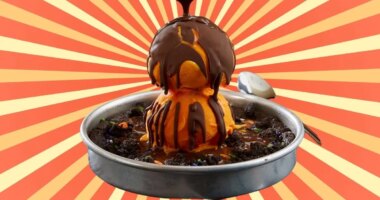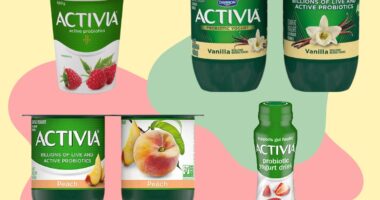When hitting a fast-food restaurant for your sandwich or burger fix, most of us can’t skip a slice (or squeeze) of melty, yellow American cheese on top. There’s something about the creamy texture that just hits right. What you may not realize, however, is that so-called “cheese” is not what you think. Not technically, anyway.
The U.S. Food and Drug Administration classifies this product, and many others, as “cheese food.” According to the agency, American cheese is actually a “pasteurized process cheese.” To be labeled as real cheese, a product needs to have a minimum of 51% actual cheese in the total weight, and the usual American slice doesn’t quite make the cut.
“Real cheese is made with four ingredients: milk, culture, rennet, and salt, ” explains award-winning cheesemaker Allison Lakin, owner of Lakin’s Gorges Cheese in Maine. “Processed cheese can contain some real cheese, but then has additives that make them shelf stable and more melty, and cost much less than real cheese.”
Lakin notes, “If what you’re exposed to is only the flavors of processed cheddar or Swiss, then the complexities and variations in the flavor of real cheese can be a surprise, as not all cheddar and Swiss cheeses taste the same.”
But just because it’s not the genuine article doesn’t necessarily mean you should skip this topping. “Sometimes nothing hits the spot like that melted Kraft single,” Lakin says.
Many fast food chains use so-called cheese food because it stays fresher longer, and melts better with additions like corn starch. Ahead, we look at the chains that use this product to give their sandwiches that desirable, if not entirely authentic, melty topping.
McDonalds
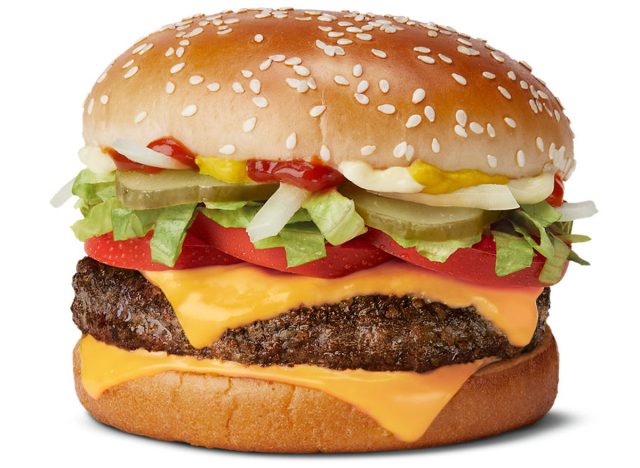
That tasty, melty slice on your Big Mac, is it real cheese? Well, it is listed on McDonald’s website as pasteurized processed American cheese. What does that mean? According to The Independent, which conducted a deep dive on what makes of some of the chain’s popular menu items, the ingredients in Mickey D’s slices are as follows: milk, cream, water, cheese culture, sodium citrate, and 2% or less of salt, citric acid, sodium phosphate, sorbic acid (preservative), lactic acid, acetic acid, enzymes, sodium pyrophosphate, natural flavor, color added, and soy lecithin. Ingredients like sodium phosphate and lactic acid are added to preserve freshness and are approved by the FDA for use in food.
Burger King
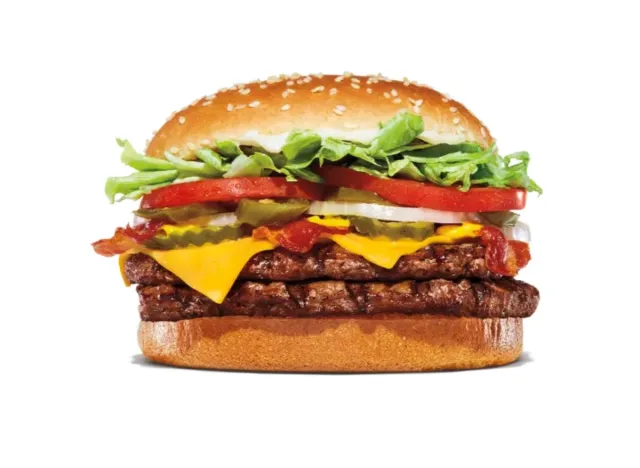
This chain seems to use real cheese on some of its sandwiches, and not on others. To be frank, the restaurant’s website isn’t particularly forthcoming on the specifics of the ingredients in any of its menu items, but sandwiches like the Whopper and the Bacon Double Cheeseburger have American cheese listed, which, per the FDA’s standards, is not considered “real cheese.” Current specials like Cheesy Tots are listed as “filled with melty cheese,” which seems curious. However, the Bacon and Swiss Royal Crispy Chicken uses Swiss cheese, which should qualify as real cheese.
Sonic Drive-in
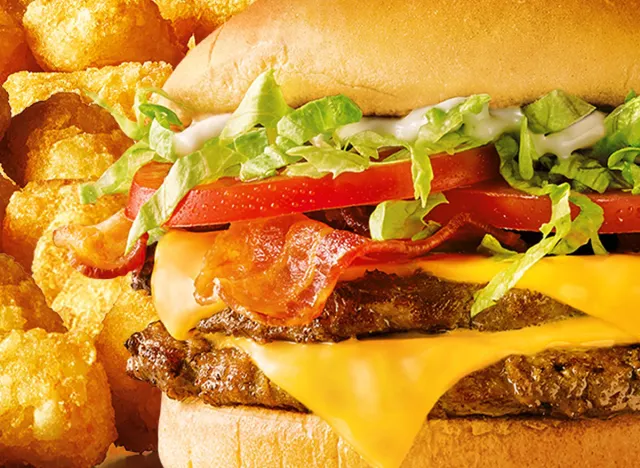
There’s a lot to love about the classic American meals you can pick up at Sonic like cheese tots and Bacon Double Cheeseburgers, but once again, this is another chain that’s not exactly transparent about the origins of its cheese. Anything listed is called “melty cheese” or “American cheese,” which suggests that your sandwich and side cheese toppers are actually processed cheese food. A few dishes, like the Chili Cheese Groovy Fries, specify that they are covered in shredded cheddar cheese, so if you’re looking for real cheese, check the menu closely.
Tim Hortons
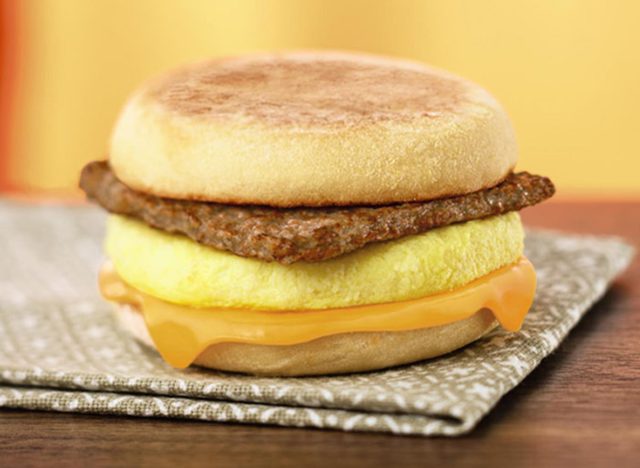
The Canadian-based chain primarily deals in coffee and breakfast sandwiches. According to Chatelaine, the restaurant’s breakfast sandwiches are made with processed cheese by default, but you can customize and switch to real cheddar cheese instead for a healthier breakfast option. It’s worth noting that processed cheese often has significantly more sodium than traditionally made cheese.
Dairy Queen
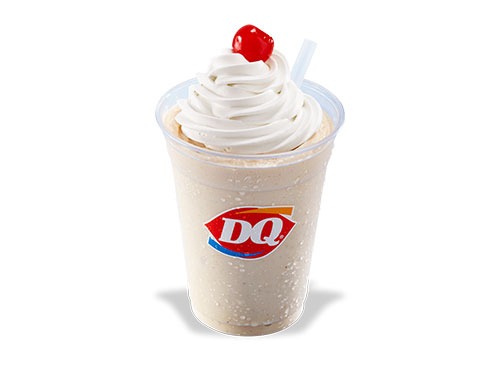
DQ is famous for its frozen desserts and American fast-food classics, but the ingredients are not always so wholesome. For instance, the menu specifically mentions “shakes” instead of “milkshakes” for a reason. The frosty beverages are made with “Artificially Flavored Vanilla Reduced Fat Ice Cream” which, according to the proper definition, is not real ice cream. Similarly, the majority of the cheese on the menu is processed cheese food. The menu is transparent about this, with a tiny asterisk on the cheeseburger description, noting that the topping is processed American.
Arby’s
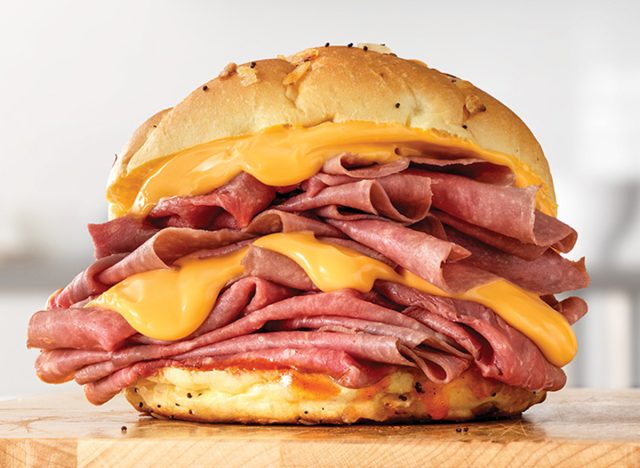
The delicious cheese sauce at Arby’s is a favorite topping, and it’s the backbone of the Classic Beef ‘n’ Cheddar sandwich. The sauce does contain real cheddar, but it’s the fourth listed ingredient, following water, canola oil, and modified corn starch. The brand’s official site doesn’t make it clear what the percentage of cheese is in this sauce, but it contains a lot of other ingredients, too, including maltodextrin, sodium phosphate, and mono- and diglycerides. Arby’s also uses processed American cheese on a number of other items, including several breakfast sandwiches and wraps.
Bojangles
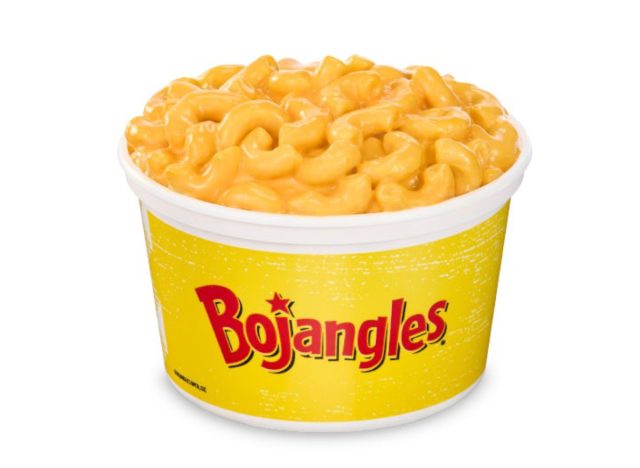
This Southern chain doesn’t use cheese as a topping on most of its menu items. However, it serves a side dish of creamy mac ‘n’ cheese that includes cheese of questionable origins. The chain’s website doesn’t detail exactly what the ingredients in the noodle dish are, but an independent consumer-run website claims that it’s a combo of processed liquid cheese with whey, modified food starch, and sodium phosphate.





